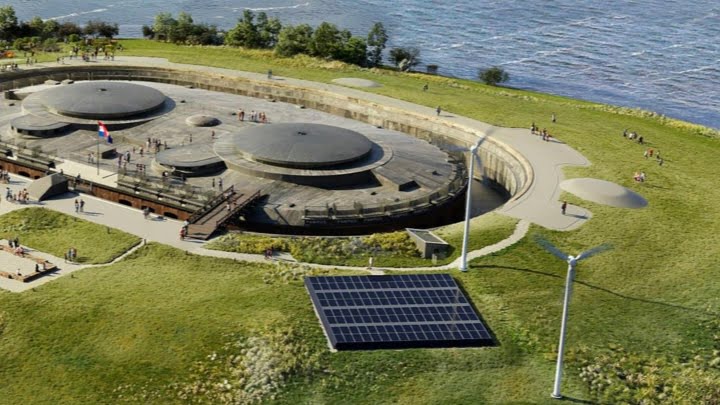
Creating sustainable energy systems in remote locations is never straightforward, but it is precisely the challenge Euto Energy took on when tasked with transforming an off-grid island.
Let’s begin by learning about Pampus to explore how this ambitious endeavor unfolded and the innovative solutions that enabled success.
Forteiland Pampus, part of the Defense Line of Amsterdam and UNESCO World Heritage Site, wanted to develop the island exactly as it was designed in the late 19th century: self-sufficient with the help of the most innovative means; in an entirely sustainable way. To preserve the island’s self-sufficiency while making a meaningful contribution to our planet and future, its heritage was developed to embrace sustainability and become fully self-reliant again regarding the (re)use of water, energy, food and resources.
At this exact point, Euto Energy empowers an off-grid island Pampus, to transition from reliance on fossil fuels to a fully sustainable energy system. This advanced system harnesses multiple renewable sources, including wind, solar, hydrogen, battery storage and biogas ensuring reliable and eco-friendly energy.
Providing reliable energy to the island’s consumers is critical, especially in the absence of a stable distribution network. Key challenges include:
The island’s heavy reliance on fossil fuels resulted in high carbon emissions, unpredictable energy costs, and frequent power disruptions due to limited fuel supply. Energy management was primarily reactive, leaving the island vulnerable to blackouts and energy shortages during peak demand or adverse weather conditions.
“You cannot manage what you cannot measure.”
Euto integrates every energy component on the island—from generation and storage to consumption. These connections occur simultaneous and seamlessly through diverse communication protocols or direct sensing and in real-time, in milliseconds scale.
With continuous insights into critical metrics like:
Euto deploys dynamic, automated processes to orchestrate energy resources efficiently, ensuring balance and reliability.
Real-time awareness of the current system status is vital, but for a self sustainable operation, predictive capabilities are non-negotiable. Nature’s unpredictability demands intelligent forecasting to adapt to changing conditions.
Euto integrates an advanced intelligence layer that:
This innovative energy management solution transformed the island’s power infrastructure. By implementing intelligent, adaptive control systems, the island shifted from reactive crisis management to proactive, efficient operations. The system dynamically adjusted to real-time conditions, maximizing the use of renewable energy while maintaining grid stability.
What was once a fossil-dependent system evolved into a resilient, self-sustaining energy ecosystem capable of adapting to environmental challenges. Carbon emissions were significantly reduced, operational costs stabilized, and power outages were eliminated. The island achieved greater energy independence, setting a new standard for sustainable off-grid living.
Now, Pampus is a self-sustaining microcosm, demonstrating how a balanced and sustainable world can be achieved once again through its self-sufficient character. By doing so, Pampus takes the most rigorous and integral approach where sustainability is concerned: starting from the historical story, making the heritage itself sustainable as an example for the rest of the world.
Euto Energy’s solutions demonstrate how cutting-edge technology can transform energy systems, creating resilient, sustainable, and self-sufficient operations even in the most challenging environments. This approach ensures the energy systems operate seamlessly, anticipating challenges before they arise.
What were the specific use cases on this island, and how did Euto solve them? Curious to learn more? Stay tuned for the next post in our Use Case series.
Are you dealing with similar issues or working on a related project? Contact us today, and let’s explore tailored solutions together.